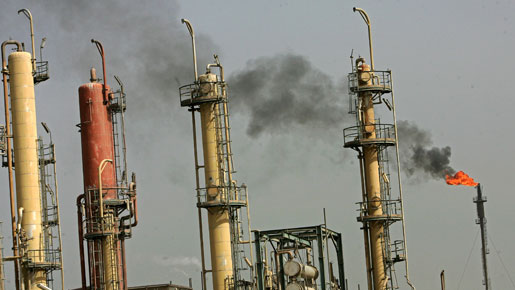
European Commission President Jose Manuel Barroso said after talks with Iraqi Prime Minister Nuri al-Maliki he hoped a memorandum of understanding could be signed within weeks, and that the country’s oil minister had been invited back to Brussels in May with an aim to concluding negotiations.
“There is very good news of progress in talks, so we can very soon establish a memorandum of understanding on energy cooperation,” Barroso told a joint news briefing with al-Maliki.
Earlier the Iraqi prime minister said the two-day visit of a large Iraqi delegation to the headquarters of the EU and NATO was aimed at deepening ties, and held out the prospect of enhanced energy cooperation and business openings for European companies.
“We do hope this meeting will result in new steps of cooperation between Iraq and EU countries, especially regarding contributing to developing our oil and gas sectors,” he said.
EU officials said ahead of al-Maliki’s visit they hoped to reach an outline agreement with Iraq to import Iraqi gas via the planned Nabucco pipeline across Turkey to central Europe.
The EU wants to diversify gas supplies away from Russia, which provides a quarter of its needs. Connecting fields in western Iraq to a planned Arab Gas Pipeline would enable Baghdad to supply gas to Nabucco, which is due to come on line in 2013.
Barroso did not give details of proposals discussed by European Energy Commissioner Andris Piebalgs and Oil Minister Hussain al-Shahristani in a separate meeting in Brussels, but said they covered gas and “some projects of regional importance for the European Union.”
The European Commission said it had secured a guarantee of 10 billion cubic metres a year of natural gas from Turkmenistan from 2009 as part of the drive to ensure sufficient supplies to make Nabucco commercially viable.
The pipeline is seen as a rival to the Kremlin-backed South Stream project due eventually to take some 30 billion cubic metres of Russian gas a year to southern Europe.
It is being jointly built by Russia’s Gazprom and Italy’s ENI. Members so far include Serbia and EU states Bulgaria, Hungary and Greece. Ties between the 27-member EU and Iraq have been gradually deepened since the US-led 2003 war vehemently opposed by countries such as France and Germany.
The bloc is a substantial donor to the country and in 2005 launched a rule of law mission that has so far trained 1,450 judges, investigators and top police and penitentiary officials.
Barroso said negotiations launched two years ago on a trade and cooperation pact between the EU and Iraq were progressing but he gave no timeframe for a deal. The pact is to cover trade in goods, services, customs and public procurement rules.
Earlier, al-Maliki gave a European Parliament committee an upbeat assessment of Iraq’s efforts to get its war-ravaged society and economy back on track.
He said Iraq was “close to agreeing a final version” of a long-awaited oil and gas law, delay over which has held back investment in the sector.
Iraq’s deputy parliament speaker, Khaled al-Attiya, said on Tuesday the government and Kurdish officials would resume talks soon to try to iron out disputes holding the law up.
An oil ministry official said the main reason for the delay was because of contracts signed by the Kurdish regional authorities.

